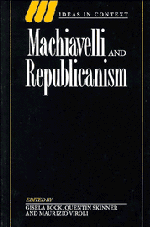Book contents
- Frontmatter
- Contents
- List of contributors
- Acknowledgements
- I MACHIAVELLI AND THE REPUBLICAN EXPERIENCE
- 1 Machiavelli and Florentine republican experience
- 2 Machiavelli and the crisis of the Italian republics
- 3 Florentine republicanism in the early sixteenth century
- 4 Machiavelli, servant of the Florentine republic
- 5 The controversy surrounding Machiavelli's service to the republic
- II MACHIAVELLI AND REPUBLICAN IDEAS
- III MACHIAVELLI AND THE REPUBLICAN HERITAGE
- IV THE MORALITY OF REPUBLICANISM
- Index
- Title in the series
5 - The controversy surrounding Machiavelli's service to the republic
Published online by Cambridge University Press: 05 July 2011
- Frontmatter
- Contents
- List of contributors
- Acknowledgements
- I MACHIAVELLI AND THE REPUBLICAN EXPERIENCE
- 1 Machiavelli and Florentine republican experience
- 2 Machiavelli and the crisis of the Italian republics
- 3 Florentine republicanism in the early sixteenth century
- 4 Machiavelli, servant of the Florentine republic
- 5 The controversy surrounding Machiavelli's service to the republic
- II MACHIAVELLI AND REPUBLICAN IDEAS
- III MACHIAVELLI AND THE REPUBLICAN HERITAGE
- IV THE MORALITY OF REPUBLICANISM
- Index
- Title in the series
Summary
At the origin – or very close to it – of Machiavelli's encounter with the traditions of republican history and thought lies his complex relationship to the Florentine republic that he served for fourteen years as chancellor and secretary. Machiavelli himself, in the dedicatory letters of both The Prince and the Discourses, emphasised the ‘lunga esperienza’ and ‘pratica’ of modern events together with the reading of ancient texts as the twin sources of his knowledge of politics. In fact most of the usual images of Machiavelli's years in the chancery derive from these and a few other famous sentences (mostly in the great letter to Vettori of December 1513) that he wrote after the fall of the republic and the Medicean restoration forced him out of office: the picture of the tireless and self-effacing public servant, full of good faith and honesty, who paid a heavy price for such devoted service. Clearly, these post-1512 representations by Machiavelli of his chancery years are coloured by the bitterness he felt over his dismissal and humiliation.
But what did that experience seem like during the years it unfolded, both to Machiavelli and to those with whom, in one way or another, he worked? And, in the light of what we can learn about his activities and experience before 1512, what can be said of its relationship to his later writings on republics?
- Type
- Chapter
- Information
- Machiavelli and Republicanism , pp. 101 - 118Publisher: Cambridge University PressPrint publication year: 1991
- 1
- Cited by

